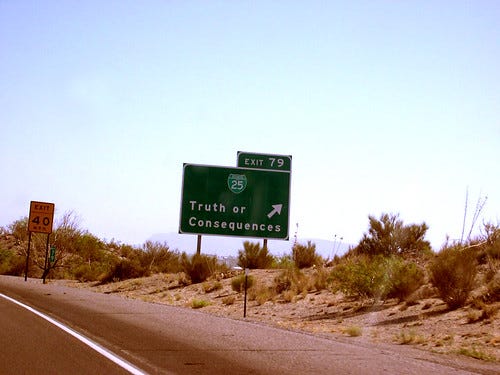Rod Ray: Truth
I believe that even in today’s challenging and uncertain world, most Oregonians continue to want to Do the Right Thing. And, together, in Trust, we will strive to find the best way forward.
EDITOR’S NOTE: Thank you all for being a part of The Oregon Way. I am so thankful for this community. It’s a privilege to work with contributors that share my desire for a stronger, more connected Oregon. Please take the time to thank the contributors for their pro bono submissions and share your favorite Oregon Way post with loved ones this Thanksgiving.
As always, please send me any and all feedback, kfraz@berkeley.edu.
****************************************
Rod Ray: Former CEO Bend Research, Inc. Ph.D. Chemical Engineer. "Courtesy Professor" OSU-Cascades, teaches Leadership, Strategic Planning, and Thermodynamics.

In order to “Do the Right Thing,” it is critically important to start with Truth. Truth is the basis for making the best decisions, and the starting point from which to persuade stakeholders to put their energy and focus behind a Vision. Truth can seem simple; it is what it is…And it turns out discerning Truth can be harder than one might think.
When I was a kid growing up in Oregon, “Truth” was all important. My family of nurses, engineers, and serving or former military officers dealt in pragmatic, black and white “Truths” every day. Examples of “day-to-day Truths” included the amounts and timing of medicines, the right size for a pipe, the best design for a bridge and—in my case at school—how to spell a word correctly or get the right answer on a math problem.
In my world back then, it was unthinkable to tell anyone anything other than the Truth about any subject at any time—and punishment for “Untruths” was swift and decisive. It was my impression as a kid that leaders in business, government, and the military all told the Truth or they wouldn’t be leaders…it all seemed pretty clear.

Where did Truth go?
As I progressed through K-12, higher education, and then entered the world of engineering, science, and business, I slowly and painfully began to realize that “Truth” was often not as clear as I once thought—and Truth could be often be difficult to ascertain. I learned that the Truths I was so sure of as a kid were known as “Objective Truths” and were primarily fact or data based. To be sure, it is possible to manipulate the data and facts from which these objective Truths flowed. Still, “Truth” was usually pretty clear, and it seemed that it could be recreated from the same data over and over again.
Much tougher are “Subjective Truths.” According to the Stanford Encyclopedia of Philosophy, Subjective Truth is “dependent upon opinion and perspective.” I learned over the years that when it comes to Subjective Truths it is all important to determine the “best Truth possible”—the one that best describes the situation or relates the situation most accurately and ethically.
Determining Subjective Truth is often an exercise in conscience—what “feels” right. This is hard to do alone. In trying to figure out what is Truth in a complex world, it is helpful—even imperative—to engage in discourse and listen to a wide range of points of view. Determining the “best Truth” in this subjective space takes work, and much discussion, with thoughtful people who garner and deserve your trust. If the goal is to do the right thing, then wrangling the situation to a place that feels like “Truth” before making a decision, or before deciding on a new Vision, is critical.
Why is determining the best “Subjective Truth” so important? Developing a Vision (the desired future state) needs a basis of Truth from which to proceed. As you embark on a way forward through uncertain territory (in science, business, political leadership, or the military)—Truth as your starting point and North Star will ground stakeholders in the moment and in a place of confidence. Starting from Truth will also minimize bias and self-interest. A journey grounded in Truth will also diminish the possibility of launching into uncertain territory.
How to find Truth? Trust.
Wrangling a situation—after weighing the “facts” and considering the biases—down to a Truth that feels right requires Trust. It is imperative to be able to try out various points-of-view within a trusted group with the common characteristic of mutual trust, and the will to do the right thing—no matter the situation.
This “wrangling” is not easy and must allow individuals to take risks as well as to make mistakes. It has to be OK to float ideas and “trial balloons,” which is only possible where it is understood that some of these ideas will be “wrong” or turn out to not to be “Truths” in the end. Once spoken out loud many of these “trial Truths” will appear to be off-base—false trails. This is where the trust comes in—it must be agreed that all discourse is important so as to identify the best way towards Truth. If allowed to run its course, such a trust-based discussion will naturally discard these false trails as self-evident. And the discourse will steadily wend its way towards the Truth.
Once determined to satisfaction, Truth can then be communicated to all those (stakeholders) affected by the Vision and the way forward becomes clear to everyone with a stake. This will create common ground, based on the Truth, for agreement and buy in on the Vision. This shared Vision will then show the way through a crisis—and/or ground stakeholders as they create better science, do better business, and improve our society and culture.
I believe that even in today’s challenging and uncertain world, most Oregonians continue to want to Do the Right Thing. And, together, in Trust, we will strive to find the best way toward determining Truth as the basis for Vision through these uncertain times in an uncertain world.
*************************************
Keep the conversation going:
Facebook (facebook.com/oregonway), Twitter (@the_oregon_way)


